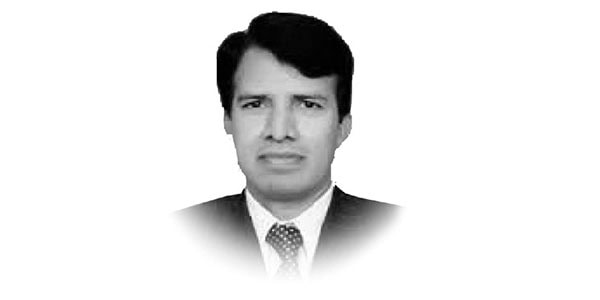Political chaos in Pakistan
AFTER the unconstitutional move by Deputy Speaker of National Assembly, there started political chaos and confusion in Pakistan.
The unconstitutional dissolution of the National Assembly and pending decisions at Supreme Court of Pakistan further worsened the political crisis.
Stepping ahead or else following the precedence set in National Assembly, a symbolic session of the Punjab Assembly elected PML (N) Hamza Shahaz as the Chief Minister of the Province.
There are exchanges of unconstitutional statements by the political leadership against each other and some insane political advisors of the Prime Minister, Imran Khan have hinted for a civil war in the country.
This all is taking place without a central authority at the federal level. The inchrage Prime Minister is fully exploiting the situation in favour of his political party and future political gains.
While this all is taking place, the state and the people of Pakistan are suffering.There is no central authority to control the situation and economic crisis are further deepening in Pakistan.
Though governance system has been to its lowest ebb in the last three and half years, it has reached to a new low in the backdrop of on-going political crises.
Since these crises are outcome of the violation of the Constitution by Prime Minister Imran Khan and his team, therefore they should be held responsible for the chaos and connected crises in Pakistan.
Had they followed the constitutional procedures, a smooth transition would have taken place upholding the democratic norms and adherence to the Constitution.
How can the violators of the Constitution claim to be legal, its protectors and have the right to rule the state.
The on-going situation in Pakistan is an unfortunate state of affairs which the Supreme Court must take into consideration for defining the future political course of action in the country.
There is a need to under that, the state is the basic unit in an anarchical international system and has to be strengthened internally through political system and by upholding the Constitution.
At the domestic level the political, economic and social activities of its masses revolve around the state and its interests.
The political forces (political parties) pursue the state’s interests through a political system while making judicious use of all elements of national power.
In the domestic politics, the activities of political forces in any state are bound to follow some set rules, values and procedures which are known as political ethics.
Indeed, “Ethics and politics are inseparable” hence must be practiced and demonstrated accordingly.
The relationship between ethics and politics is deeper and intimate for the states like Pakistan which follow an ideology of a Divine religion; Islam.
In the wordings of Allama Dr Muhammad Iqbal, “Jalal-e-padshahi ho ki jamhuri tamasha ho, Juda Ho Deen Sayasat Say To Reh Jati Hai Changezi”.
This clearly reflects the picture of politics where there are no values (since religion is all about morality and values) and in the absence of values, it is all the ‘law of jungle’.
The law of the jungle depicts a situation where there are no tenets, no rules and people use force to get what they want.
The Constitution of Pakistan is based on golden principles of Islam which is an advocate of morality, values and ethics.
The leaders of political parties should be specimen and true reflection of the values and ethics for rest of the masses and society they represent.
Indeed, they derive power from the masses and the people whom they govern subsequently.
In order to be effective leaders, the political parties must demonstrate ethics which give them moral ascendancy over law of jungle.
Unfortunately, almost all political parties in Pakistan are publically demonstrating a culture which has no values, no ethics and no morality.
This is, in fact, is a violation of their written party constitutions and manifestoes. Their publicly demonstrated activities during the current crisis give a wrong message to general masses, especially the youth, which constitutes over 60% of the total Pakistani population.
Whereas, the power should come from the people, the demonstrated brand is that, it comes from violence, mayhem, use of force, abusive language, money, political bribe and immoral practices.
The political forces should demonstrate the compliance of law and its enforcement through a fair-play and ethics.
But, the practices are totally different and indeed, contradictory in nature. Practically, the political forces are promoting a system of political violence and antipathy, social fragmentation and intolerance and religious bigotry and revulsion.
While, state and its interests and adherence of Constitution of Pakistan should be the focus of all political parties, the demonstrated practices are otherwise.
National interests and masses are the missing links in the power politics of all political and religio-political parties of Pakistan.
Their immediate aims are to grab power (through any means may be unconstitutionally) and the subsequent objectives are to remain in power even through on unjustifiable grounds.
Away from state-centric national politics, the political parties of Pakistan are individual based family-centric, irrespective of capabilities and potentials of members of these dynasties.
The unethical and indeed the unconstitutional politics in Pakistan cannot be expected to nurture a political culture in the country which brings morality, values, rule of law, fair-play and ethics.
Similarly, the dynastic politics of contemporary political parties in Pakistan is not anticipated to encourage democracy in the wider politics of Pakistan.
Besides, there are cartels (interest groups) of virtually all types who firmly support the current format of immoral politics in Pakistan.
Under the ongoing crisis, the people of Pakistan expect a clear direction by Supreme Court of Pakistan in line with Constitution of Pakistan.
— The writer is Professor of Politics and IR at International Islamic University, Islamabad.










